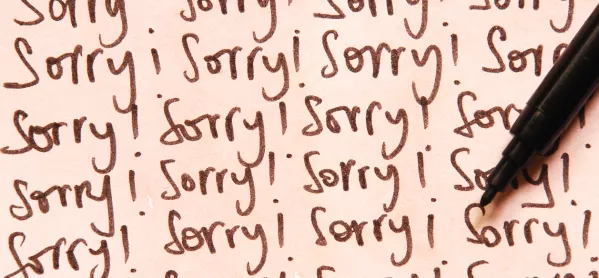Have we moved on from the Dominic Cummings saga yet? Maybe. Maybe not.
I was one of the countless viewers who watched him brazen out a shaky defence in the rose garden of No 10, my blood boiling, not least because he didn’t even feel it appropriate to say sorry. How dare he not apologise?
We deserve an apology…don’t we?
Here’s the thing, though: forced apologies are pointless. Meaningless, in fact. That’s why, at my school, we never insist a child say sorry when involved in an incident.
Sorry, but insincere
Working in schools all these years, I couldn’t tell you how many times I have heard a child being told to apologise for their behaviour, which, of course, they do in one of three ways:
- Mumbling “sorry” begrudgingly, looking at the floor and shuffling their feet, in a desperate attempt to get out of there.
- Eyeballing the member of staff smiling sarcastically and announcing an ironic “sorry”, the intent of which is, of course, the polar opposite.
- Genuinely and wholeheartedly offering an apology having reflected on what they did and the upset it caused.
Unfortunately, my impression is that versions one and two are far more prevalent in education settings across the country. I understand why an apology might seem important, but the truth is that an apology without authenticity doesn’t help anyone.
Meaningful attempts to make good
So, we don’t ask pupils to verbalise anything. What we do have is a clear expectation that pupils make good a situation, but only when they have had some or all of the following:
- An opportunity to calm down or regulate.
- Time and support to process what happened.
- Space to reflect on why it happened (including being listened to).
- A discussion around the impact their behaviour choice might have had on others.
This may take moments, hours or even days if it follows a fixed-term exclusion. Making good might be a smile, a hug, a change in behaviour, eye contact, offering to help carry something or encouraging others to do the right thing.
It could be something else entirely. It could be all of these. It could even be that genuine heartfelt “sorry” that I eluded to earlier.
Real change
The fact is, though, that simply getting someone to apologise doesn’t change anything. Honest reflection, striving to do something differently or better, being willing to admit fallibility: these are the things that matter.
These are the little interactions and communications that will ultimately make for a more positive and empathetic school community and wider society as a whole.
So, while Cummings may never say that magic word, some reflection and honesty would go much further toward healing the hurt and mistrust he has caused. We can only hope.
Kate Martin is vice-principal at Restormel Academy, an alternative provision school in Cornwall. She is on Twitter @k8martin




